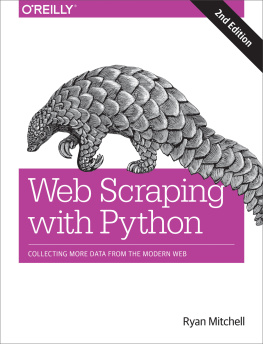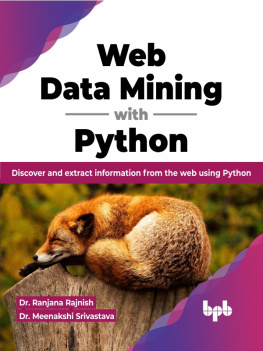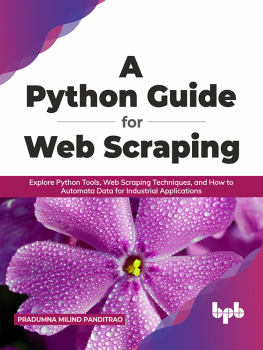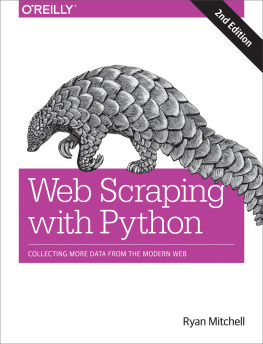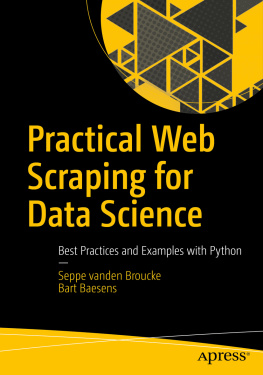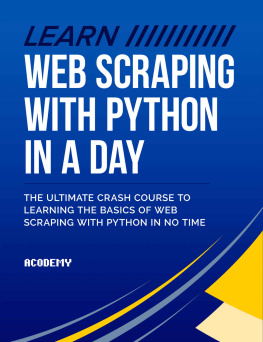Ryan Mitchell - Web Scraping with Python
Here you can read online Ryan Mitchell - Web Scraping with Python full text of the book (entire story) in english for free. Download pdf and epub, get meaning, cover and reviews about this ebook. year: 2018, publisher: OReilly Media, Inc., genre: Computer. Description of the work, (preface) as well as reviews are available. Best literature library LitArk.com created for fans of good reading and offers a wide selection of genres:
Romance novel
Science fiction
Adventure
Detective
Science
History
Home and family
Prose
Art
Politics
Computer
Non-fiction
Religion
Business
Children
Humor
Choose a favorite category and find really read worthwhile books. Enjoy immersion in the world of imagination, feel the emotions of the characters or learn something new for yourself, make an fascinating discovery.
- Book:Web Scraping with Python
- Author:
- Publisher:OReilly Media, Inc.
- Genre:
- Year:2018
- Rating:4 / 5
- Favourites:Add to favourites
- Your mark:
- 80
- 1
- 2
- 3
- 4
- 5
Web Scraping with Python: summary, description and annotation
We offer to read an annotation, description, summary or preface (depends on what the author of the book "Web Scraping with Python" wrote himself). If you haven't found the necessary information about the book — write in the comments, we will try to find it.
Ryan Mitchell: author's other books
Who wrote Web Scraping with Python? Find out the surname, the name of the author of the book and a list of all author's works by series.
Web Scraping with Python — read online for free the complete book (whole text) full work
Below is the text of the book, divided by pages. System saving the place of the last page read, allows you to conveniently read the book "Web Scraping with Python" online for free, without having to search again every time where you left off. Put a bookmark, and you can go to the page where you finished reading at any time.
Font size:
Interval:
Bookmark:
by Ryan Mitchell
Copyright 2018 Ryan Mitchell. All rights reserved.
Printed in the United States of America.
Published by OReilly Media, Inc. , 1005 Gravenstein Highway North, Sebastopol, CA 95472.
OReilly books may be purchased for educational, business, or sales promotional use. Online editions are also available for most titles ( .
- Editor: Allyson MacDonald
- Production Editor: Justin Billing
- Copyeditor: Sharon Wilkey
- Proofreader: Christina Edwards
- Indexer: Judith McConville
- Interior Designer: David Futato
- Cover Designer: Karen Montgomery
- Illustrator: Rebecca Demarest
- April 2018: Second Edition
- 2018-03-20: First Release
See http://oreilly.com/catalog/errata.csp?isbn=9781491985571 for release details.
The OReilly logo is a registered trademark of OReilly Media, Inc. Web Scraping with Python, the cover image, and related trade dress are trademarks of OReilly Media, Inc.
While the publisher and the author have used good faith efforts to ensure that the information and instructions contained in this work are accurate, the publisher and the author disclaim all responsibility for errors or omissions, including without limitation responsibility for damages resulting from the use of or reliance on this work. Use of the information and instructions contained in this work is at your own risk. If any code samples or other technology this work contains or describes is subject to open source licenses or the intellectual property rights of others, it is your responsibility to ensure that your use thereof complies with such licenses and/or rights.
978-1-491-98557-1
[LSI]
To those who have not developed the skill, computer programming can seem like a kind of magic. If programming is magic, web scraping is wizardry: the application of magic for particularly impressive and usefulyet surprisingly effortlessfeats.
In my years as a software engineer, Ive found that few programming practices capture the excitement of both programmers and laymen alike quite like web scraping. The ability to write a simple bot that collects data and streams it down a terminal or stores it in a database, while not difficult, never fails to provide a certain thrill and sense of possibility, no matter how many times you might have done it before.
Unfortunately, when I speak to other programmers about web scraping, theres a lot of misunderstanding and confusion about the practice. Some people arent sure its legal (it is), or how to handle problems like JavaScript-heavy pages or required logins. Many are confused about how to start a large web scraping project, or even where to find the data theyre looking for. This book seeks to put an end to many of these common questions and misconceptions about web scraping, while providing a comprehensive guide to most common web scraping tasks.
Web scraping is a diverse and fast-changing field, and Ive tried to provide both high-level concepts and concrete examples to cover just about any data collection project youre likely to encounter. Throughout the book, code samples are provided to demonstrate these concepts and allow you to try them out. The code samples themselves can be used and modified with or without attribution (although acknowledgment is always appreciated). All code samples are available on GitHub for viewing and downloading.
The automated gathering of data from the internet is nearly as old as the internet itself. Although web scraping is not a new term, in years past the practice has been more commonly known as screen scraping, data mining, web harvesting, or similar variations. General consensus today seems to favor web scraping, so that is the term I use throughout the book, although I also refer to programs that specifically traverse multiple pages as web crawlers or refer to the web scraping programs themselves as bots.
In theory, web scraping is the practice of gathering data through any means other than a program interacting with an API (or, obviously, through a human using a web browser). This is most commonly accomplished by writing an automated program that queries a web server, requests data (usually in the form of HTML and other files that compose web pages), and then parses that data to extract needed information.
In practice, web scraping encompasses a wide variety of programming techniques and technologies, such as data analysis, natural language parsing, and information security. Because the scope of the field is so broad, this book covers the fundamental basics of web scraping and crawling in . I suggest that all readers carefully study the first part and delve into the more specific in the second part as needed.
If the only way you access the internet is through a browser, youre missing out on a huge range of possibilities. Although browsers are handy for executing JavaScript, displaying images, and arranging objects in a more human-readable format (among other things), web scrapers are excellent at gathering and processing large amounts of data quickly. Rather than viewing one page at a time through the narrow window of a monitor, you can view databases spanning thousands or even millions of pages at once.
In addition, web scrapers can go places that traditional search engines cannot. A Google search for cheapest flights to Boston will result in a slew of advertisements and popular flight search sites. Google knows only what these websites say on their content pages, not the exact results of various queries entered into a flight search application. However, a well-developed web scraper can chart the cost of a flight to Boston over time, across a variety of websites, and tell you the best time to buy your ticket.
You.) Well, APIs can be fantastic, if you find one that suits your purposes. They are designed to provide a convenient stream of well-formatted data from one computer program to another. You can find an API for many types of data you might want to use, such as Twitter posts or Wikipedia pages. In general, it is preferable to use an API (if one exists), rather than build a bot to get the same data. However, an API might not exist or be useful for your purposes, for several reasons:
You are gathering relatively small, finite sets of data across a large collection of websites without a cohesive API.
The data you want is fairly small or uncommon, and the creator did not think it warranted an API.
The source does not have the infrastructure or technical ability to create an API.
The data is valuable and/or protected and not intended to be spread widely.
Even when an API does exist, the request volume and rate limits, the types of data, or the format of data that it provides might be insufficient for your purposes.
This is where web scraping steps in. With few exceptions, if you can view data in your browser, you can access it via a Python script. If you can access it in a script, you can store it in a database. And if you can store it in a database, you can do virtually anything with that data.
There are obviously many extremely practical applications of having access to nearly unlimited data: market forecasting, machine-language translation, and even medical diagnostics have benefited tremendously from the ability to retrieve and analyze data from news sites, translated texts, and health forums, respectively.
Even in the art world, web scraping has opened up new frontiers for creation. The 2006 project We Feel Fine by Jonathan Harris and Sep Kamvar scraped a variety of English-language blog sites for phrases starting with I feel or I am feeling. This led to a popular data visualization, describing how the world was feeling day by day and minute by minute.
Font size:
Interval:
Bookmark:
Similar books «Web Scraping with Python»
Look at similar books to Web Scraping with Python. We have selected literature similar in name and meaning in the hope of providing readers with more options to find new, interesting, not yet read works.
Discussion, reviews of the book Web Scraping with Python and just readers' own opinions. Leave your comments, write what you think about the work, its meaning or the main characters. Specify what exactly you liked and what you didn't like, and why you think so.

